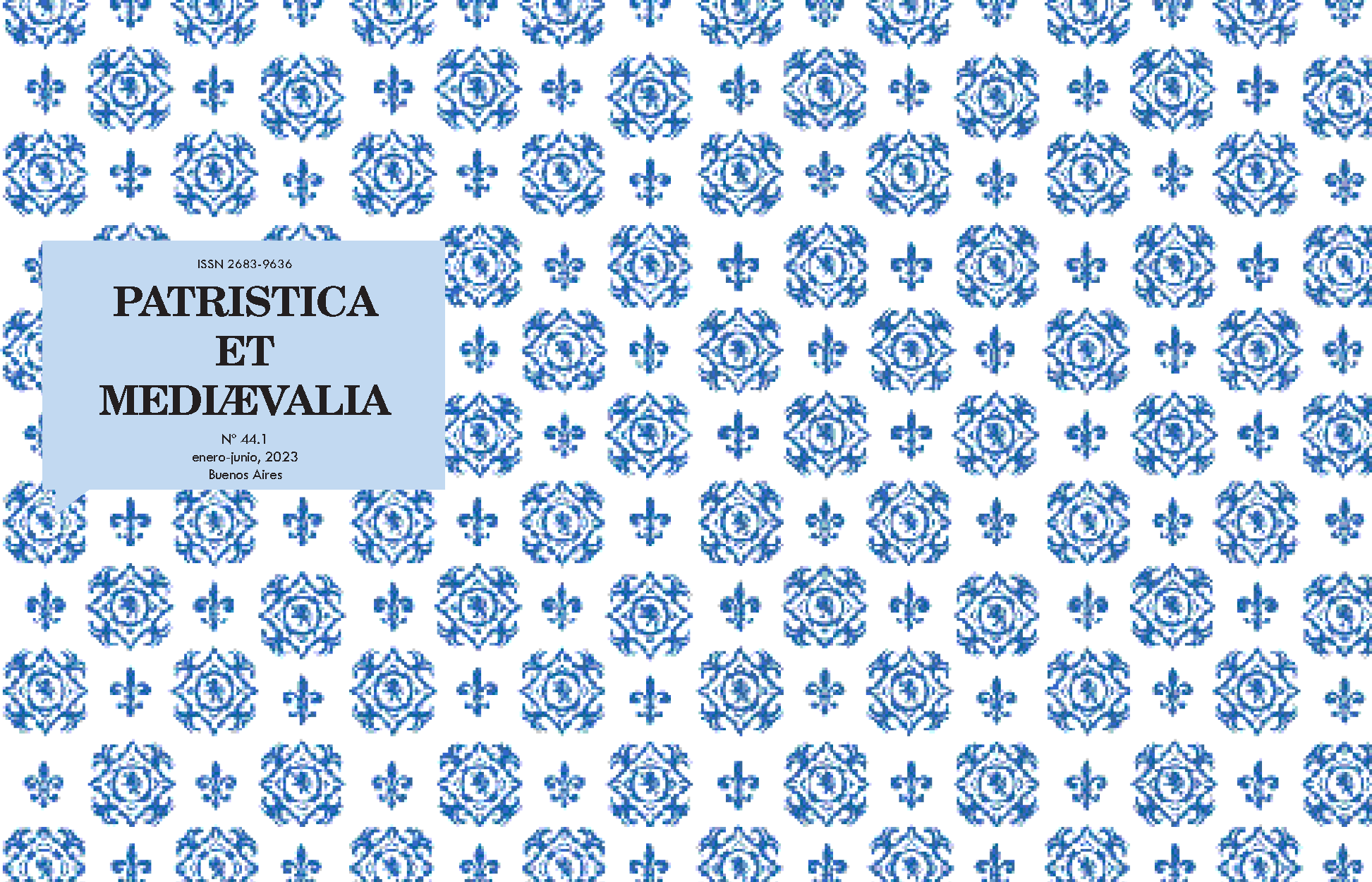Time and Attention in Evagrius Ponticus
Abstract
In this paper is discussed the place of time in the work of Evagrius of Pontus, especially as a necessary factor for the action of the logismoí, so that the time is the necessary condition for man to fall under the dominion of his passions and to find it difficult to return to the Unity. Furthermore, the author defends the hypothesis that attention is the way that, according to Evagrius, the time can be “stopped” and thus interrupted or reduce the harmful behaviour of the demons.Downloads
References
Athanase d’Alexandrie (1994). Vie d’Antoine. Ed. y trad. Bartelink, G. J. M. París: Cerf. (SC 400).
Basilio de Cesarea (1962), L’Homélie de Basile de Césarée sur le mot “Observe-toi toi-même”. Ed. Rudberg, S. Stockholm. (Acta Universitatis Stockholmiensis. Studia Graeca Stockholmiensis. 2).
Évagre le Pontique (1958). Les six Centuries des Képhalaia Gnostica d’Évagre le Pontique. Ed. y trad. Guilleaumont, A. Turnhout: Brepols. (PO 134 [28.1]).
Évagre le Pontique (1971). Traité pratique ou le moine, vol. II. Ed. y trad. Guillaumont, A. y Guillaumont, C. París: Cerf. (SC 171).
Évagre le Pontique (1998). Sur les Pensées. Ed. y trad. Géhin, P. Guillaumont, C. y Guillaumont, A. París: Cerf. (SC 438).
Évagre le Pontique (2007). Chapitres des disciples d’Evagre. Ed. y trad. Géhin, P. París: Cerf. (SC 514).
Évagre le Pontique (2017). À Euloge. Ed. y trad. Fogielman, Ch.-A. París: Cerf. (SC 591).
Évagre le Pontique (2017). Chapitres sur la prière. Ed. y trad. Géhin, P. París: Cerf. (SC 589).
Évagre le Pontique (2021). Scholies aux psaumes II. Ed. y trad. Rondeau, M.-J, Géhin, P y Cassin, M. París: Cerf. (SC 615).
Evagrio Pontico (1996). Gli otto spiriti della malvagità. Ed. y trad. Moscatelli, F. Milán: San Paolo.
Evagrio Póntico (2013 [1995]). Tratado práctico. Trad. Rubio Sadia, J. P. En: González Villanueva, J. I. (ed.). Obras espirituales. Madrid: Ciudad Nueva. (Biblioteca de Patrística 28).
Evagrio Póntico (2013 [1995]). Sobre la oración. Intro. y notas. González Villanueva, J. I., trad. Rubio Sadia, J. P., Obras espirituales. Madrid: Ciudad Nueva. (Biblioteca de Patrística 28).
Evagrio Póntico (2020). El tratado de las réplicas. Trad. Peretó Rivas R. y Heiremans, J. Madrid: Rialp.
Jean Cassien (1955). Conférences (I-VII). Ed. y trad. Pichery, E. París: Cerf. (SC 42).
Jean Cassien (1965). Institutions cénobitiques. Ed. y trad. Guy, J.-C. París: Cerf. (SC 109).
Bettiolo, P. (2009). “Discernimento dei pensieri e conoscenza del cuore. Natura e sovrennatura nell’insegnamento di Evagrio Pontico”, Rivista di Storia del Cristianesimo 6, 43-63.
Bunge, G. (2007). Akèdia. La doctrine spirituelle d’Èvagre le Pontique sur l’acédie. Bellefontaine: Abbaye de Bellefontaine.
Cataldo, G. (2007). Vita come tensione nell’antropologia di Evagrio Pontico. Bari: Ecumenica Editrice.
Corrigan, K. (2016). “Thoughts that Cut: Cutting, Imprinting, and Lingering in Evagrius of Pontus”. En: Kalvesmaki, J. y Young, R. D. (eds.). Evagrius and his Legacy. Notre Dame: University of Notre Dame Press, 49-72.
Forthomme, B. (2000). De l’acédie monastique à l’anxio-dépression: histoire philosophique de la transformation d’un vice en pathologie. París: Synthélabo.
Guillaumont, A. (2009). Un philosophe au désert: Évagre le Pontique. París: Vrin.
Larchet, J. C. (2000). Thérapeutique des maladies spirituelles. París: Cerf.
Martín de Blassi, F. (2017). “Considerations on the concept of ‘audacity’ (tólma) in Plotinus’ philosophy”, International Philosophical Quarterly 57, 19-30.
Nault, J-.Ch. (2006). La saveur de Dieu. L’acédie dans le dynamisme de l’agir. París: Cerf.
Paleschi, F. (2005). “L’acédie dans l’œuvre d’un prémontré devenu chartreux”. En: Nabert, N. (ed.). Tristesse, acédie et médecine des âmes dans la tradition monastique et cartusienne: Anthologie de textes rares et inédits, XIII -XX siècle. París: Beauchesnes.
Peretó Rivas, R. y Muñoz, C. (2013). “La compilación como práctica terapéutica en Evagrio Póntico”. En: Muñoz, M. J. y Cañizares Ferris, P. (eds.). La compilación del saber en la Edad Media. Porto: FIDEM, 309-416.
Peretó Rivas, R. (2015), “La acedia como causa de la caída del nous en Orígenes y Evagrio Póntico”, Teología y Vida 55.4, 581-593.
Peretó Rivas, R. (2017). Evagrio Póntico y la acedia. Nueva York: Peter Lang.
Peretó Rivas, R. (2019). Il ruolo del tempo in Evagrio Pontico. En: Ghilardi, M. (ed.). Tempo di Dio, tempo dell’uomo. XLVI incontro di Studiosi dell’Antichità Cristiana. Roma: Nerbini, 619-623. (Studia Ephemeridis Augustinianum 155).
Peretó Rivas, R. (2019). “El ‘demonio errante’ en Evagrio Póntico y José Hazzaya”, Salmanticensis 66.3, 311-329.
Peretó Rivas, R. (2019). “Las funciones de la atención en la homilía Sobre las palabras ‘Permanece atento a ti mismo’ de San Basilio”, Espíritu 158, 485-501.
Torchia, J. (1989). “Satiety and the Fall of Souls in Origen’s De Principiis. En: Livingstone, E. (ed.). The Second Century, Tertullian to Nicea in the West, Clement and Origen, Cappadocian Fathers. Leuven: Peeters, 465-472. (Studia patristica 18/3)
Vázquez, S. (2018). “La enfermedad del alma en el filósofo tardoantiguo Evagrio Póntico: entre ignorancia y filautía”, Anales del Seminario de Historia de la Filosofía 35.2, 323-343.
Vazquez, S. (2022). Enfermedad y Terapéutica del alma en Evagrio Póntico. La palabra del gnóstico como instancia curativa de la enfermedad del alma. Paderborn: Brill - Schöningh.
1. The authors who publish in this magazine accept the following conditions:
-
They retain the copyright and grant to the magazine the right of the first publication, with the work registered under the Attribution-ShareAlike 4.0 International License that allows third parties to use what is published as long as they mention the authorship of the work and the first publication in this magazine.
-
They can make other independent and additional contractual agreements for the non-exclusive distribution of the version of the article published in this magazine (eg. include it in an institutional repository or publish it in a book) provided that they clearly indicate that the work was first published in this journal.
-
They are allowed and recommended to publish their work on the Internet (for example on institutional or personal pages).
2. AutoArchive Conditions. Authors are allowed and encouraged to distribute post-print electronic versions of their manuscripts because it promotes their circulation, a possible increase of quotation and a major reach among the Academic community. Color RoMEO: blue.













